How the Congressional Hackathon helped the House work better for the People
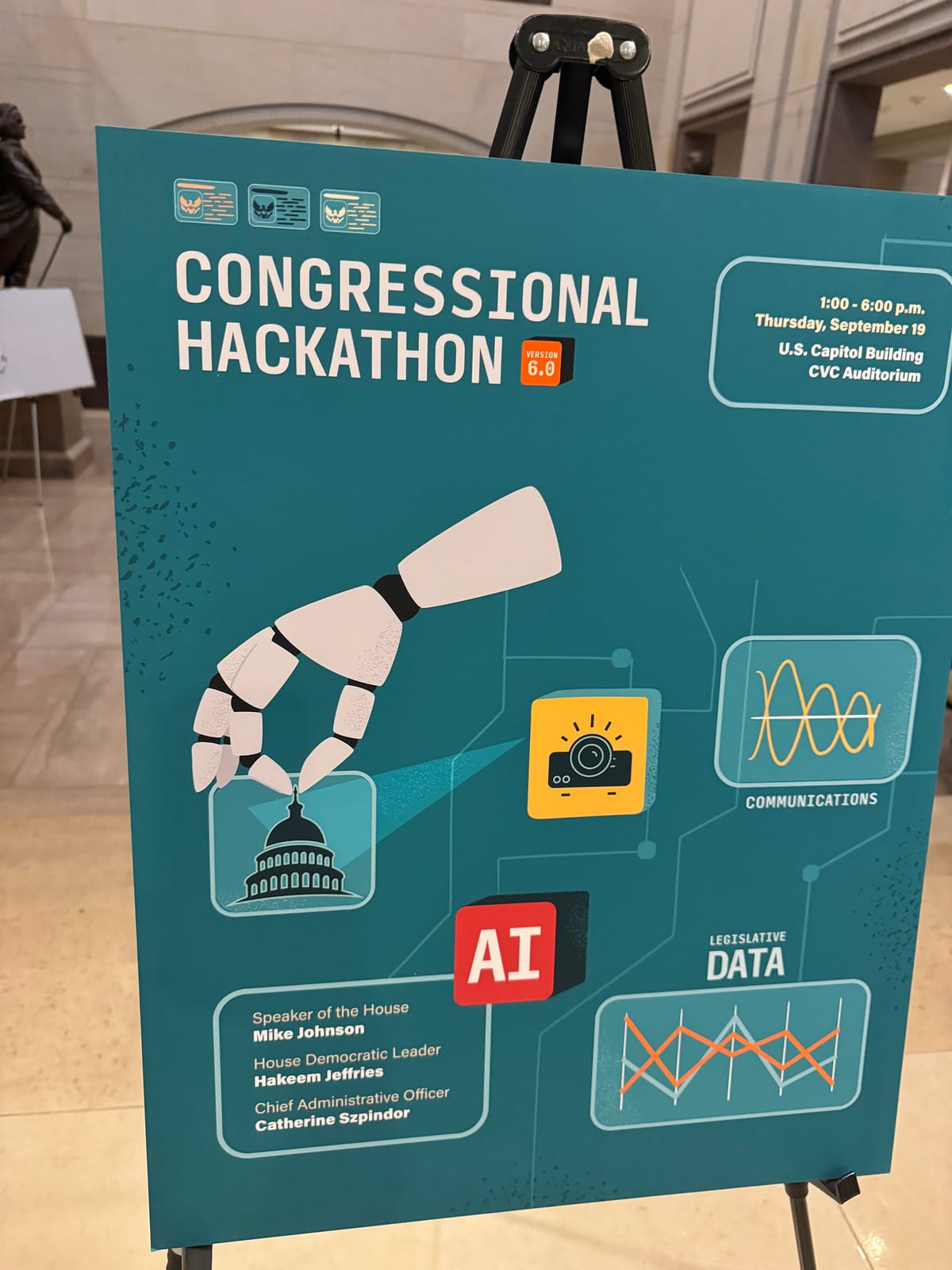
Good afternoon from cloudy Washington, where fall arrived on Sunday, along with a continuing resolution that will, if enacted, avert a government shutdown in October. (Thanks to Politico for linking to the bill, for folks who like to read then.)
It’s good news for everyone who would be harmed by another shutdown, from federal workers who can’t afford one to the Members of Congress would be blamed for it. As October surprises go, shutdowns rank with wasps in your cider or rotten apples at the bottom of your bushel.
What I want to share today, isn't just the prospect of Congress (barely) doing its job by keeping the federal government operating through a continuing resolution.
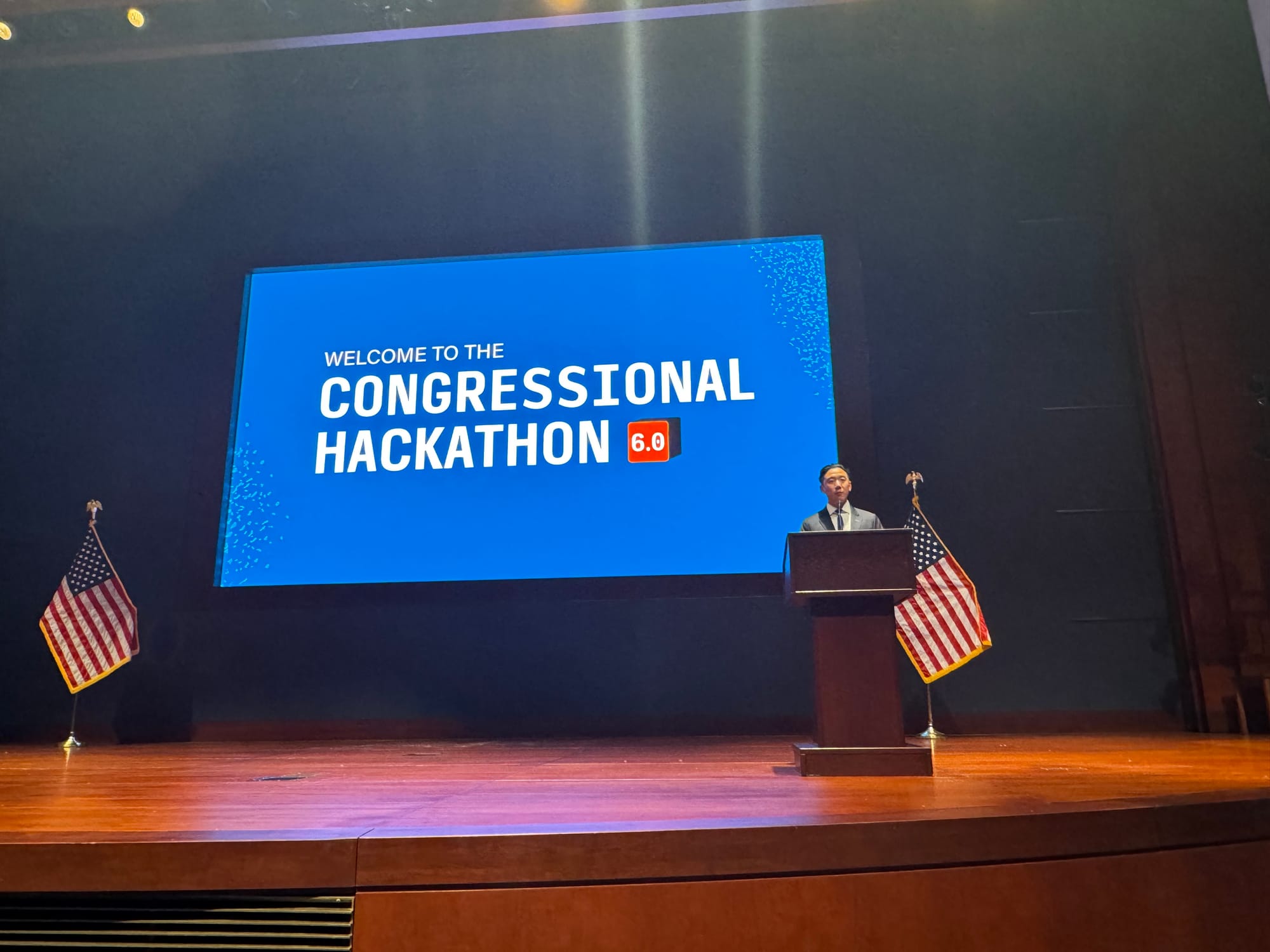
It’s that since 2011, a new bipartisan institution co-created with open government advocates and civic technologists has quietly improved how the House works. These improvements have come both for the people who craft legislation, conduct oversight, help constituents and work there and everyone else who their public business serves.
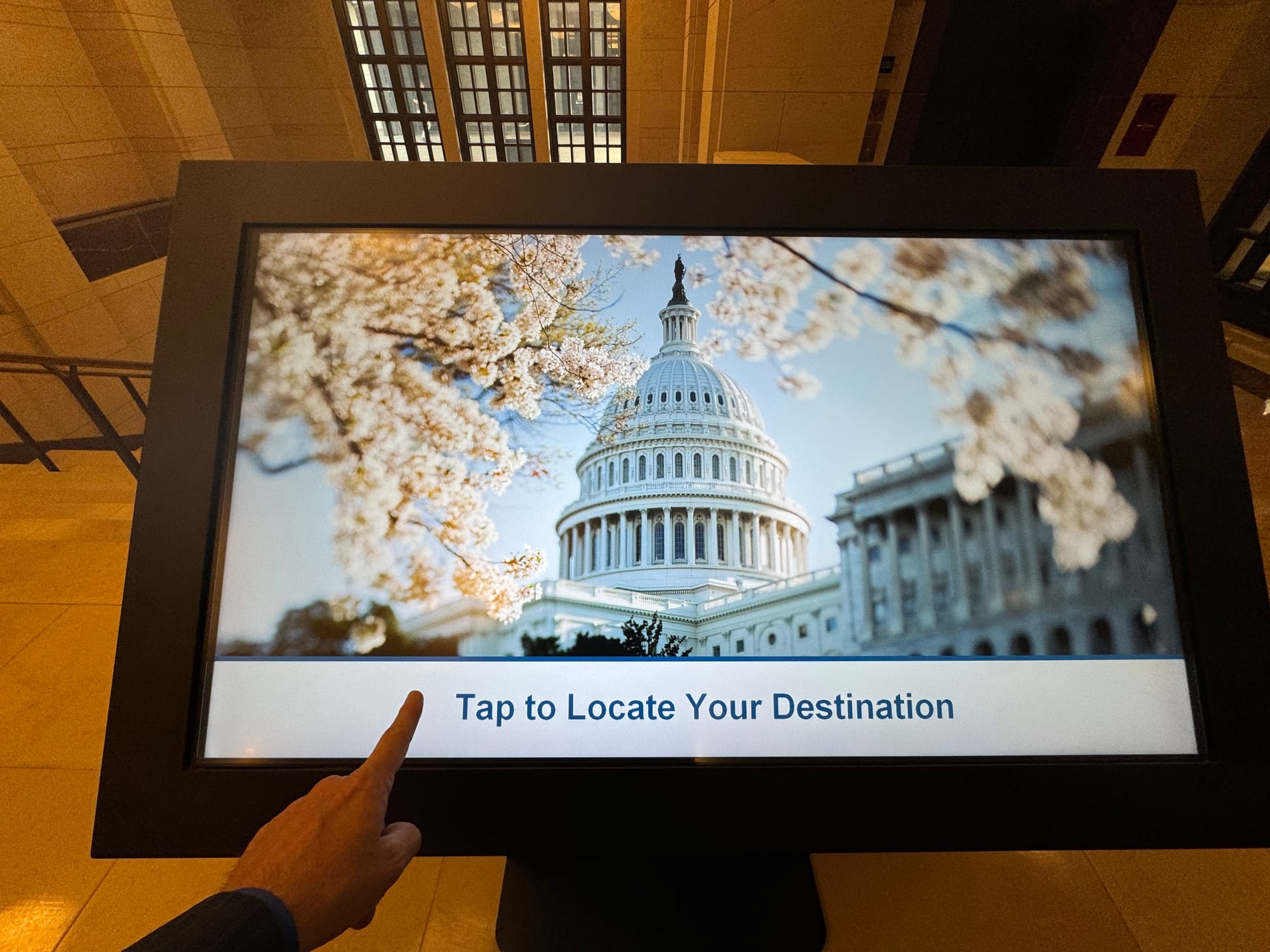
That’s why I pulled on a suit, walked over to Congress on Thursday, and grabbed a front-row seat to history. I even bore witness using my smartphone, recording and uploading remarks by Members of Congress, starting with Speaker Mike Johnson‘s remarks.
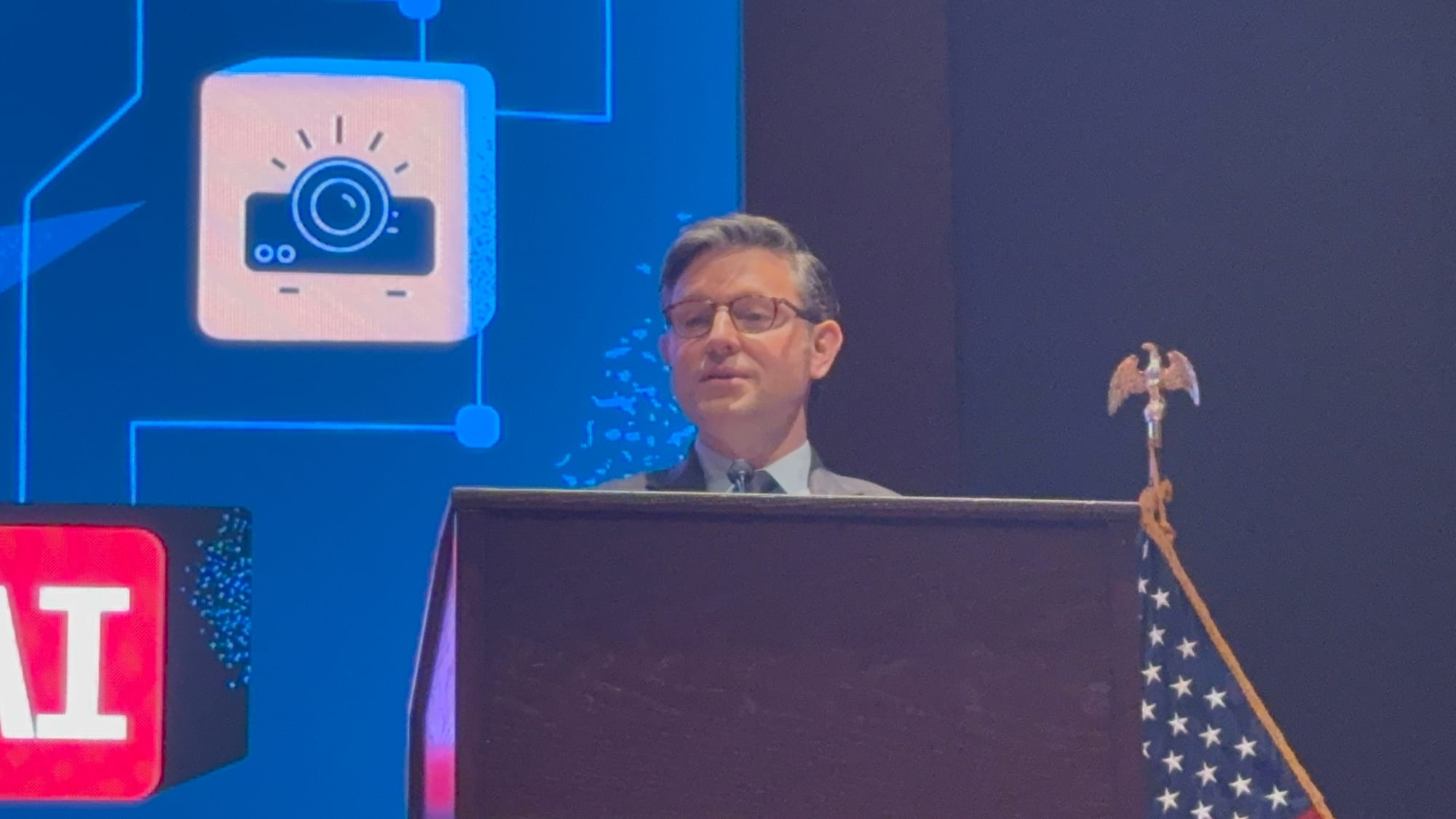
Even with the miracles of emerging media and a decade of inspiration, the six iterations of the Congressional Hackathon has not been an easy story to tell. There’s no heat or conflict to draw attention with viral ragebait or staged outrage.
Instead, there’s been steady bipartisan collaboration around nonpartisan goals, from opening up data to modernizing the tools staff depend on, as Madison Elder reported for Fedscoop.
When I wrote in 2015 that the biggest innovation at the second hackathon was Members of Congress working together, my then-editor was honestly somewhat incredulous. Where was the news here? Why should be people care?
After all, there isn’t a lot of actual hacking going on, unlike the hackathons I’ve attended at universities, tech companies, or “crisis camps“ form a decade ago. (House rules preclude that kind of collaboration on site at present.)
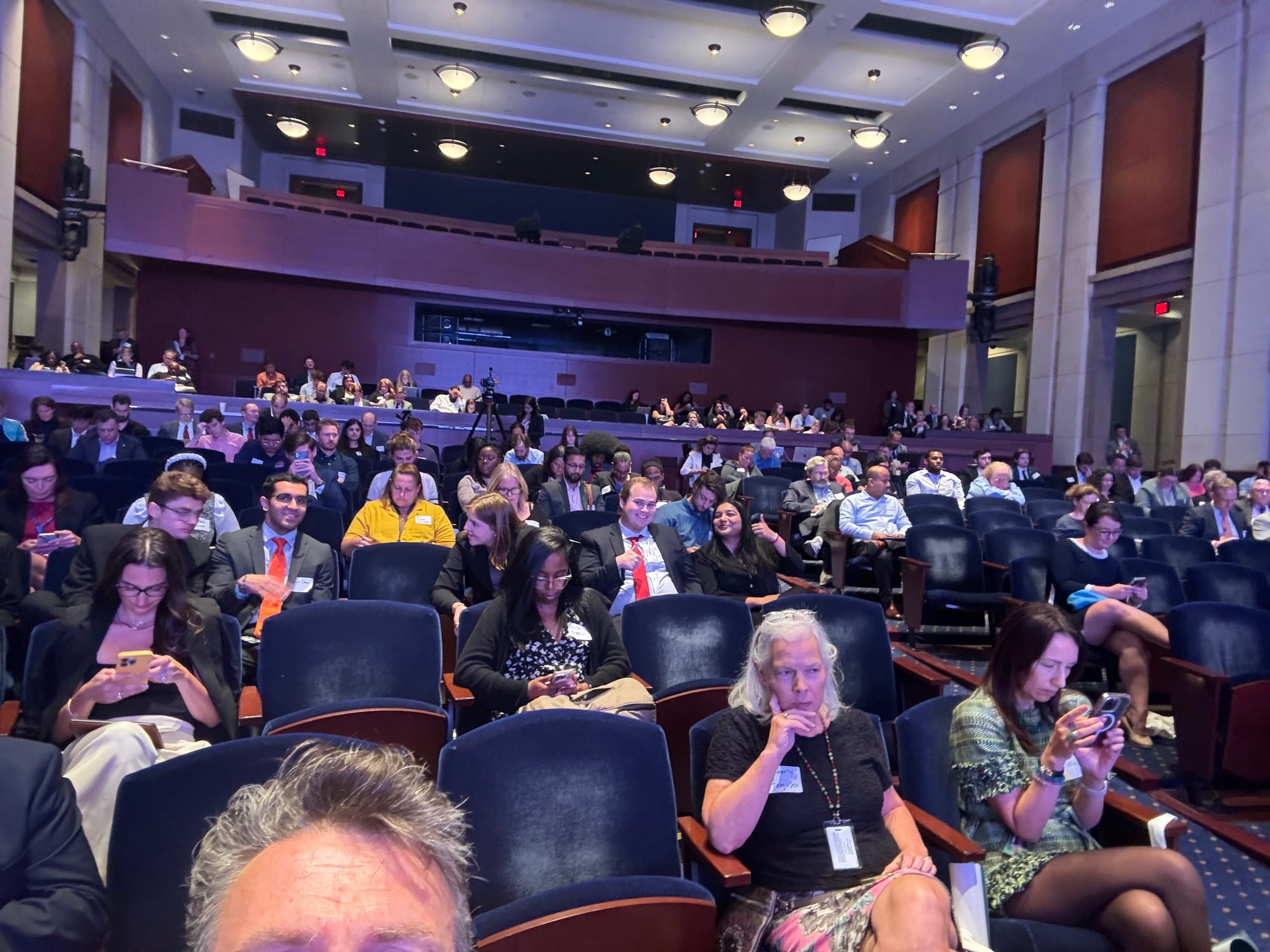
By necessity, then, the Congressional hackathon has instead evolved into a hybrid event featuring speeches from Congressional leaders and House administrative staff, followed by panel discussions, pitches and presentations from staffers or external developers and students, breakout groups that brainstorm ideas that could help Congress work better, and then development over the course of the year to follow.
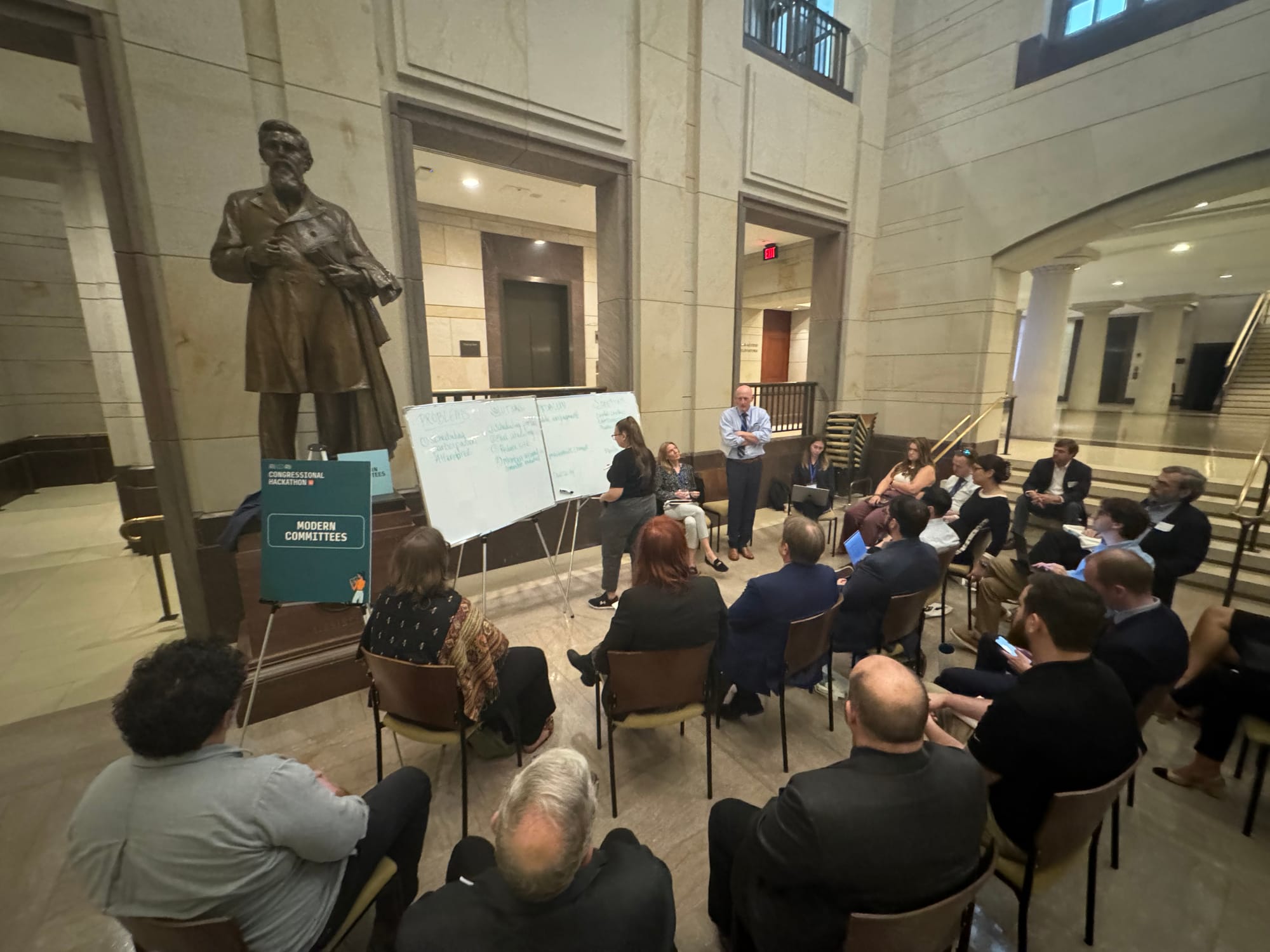
As it turns out, that’s where the magic happens.
As Madison Alder reported over at Fedscoop in her recap of this year’s event, Rep. Derek Kilmer recounted how the ideation at the hackathon and the Modernization Committee he chaired can result in ideas to modernize Congress, and noted that future proposals “should come from Americans of different ages, backgrounds, and walks of life.” Just so.
You can watch my recording of Rep. Killmer’s full remarks on YouTube, too. If you do, you’ll note the fulsome praise Speaker Johnson offered him in a generous introduction, just in case you’re dubious about your correspondent’s claims of bipartisan collaboration.
In his remarks, Rep. Steny Hoyer similarly hailed what over a decade of collaboration has wrought, from opening up government data to the public to institutonalizing a more open culture around it. (Check out the work of the Congressional Data Coalition to get more into the details on that count.)
In 2024, the focus of the presenters and attendees was much less on data, however: this was the year that artificial intelligence was in the zeitgeist, from the Speaker’s remakes to those of Rep. Jay Obernolte, who chairs the House AI Taskforce, to the many ways speakers proposed integrating generative AI and machine learning into the legislative process, public engagement, communications, and much more.
And while we didn’t get to see a hard copy or virtual version of it, the Committee on House Administration and House Chief Administrative Officer also announced a new AI policy last week, on September 19th. A public fact sheet says the policy will provide” a framework for the “expanded use” of AI in the House with ”appropriate guardrails and specific AI principles that will guide both Members and institutional offices as they responsibly incorporate this technology into their operations.”
The fact sheet says the new House AI policy now defines a “process for the Chief Administrative Officer (CAO) to review and the House Administration Committee to approve AI tools for defined use cases” that will assist offices to reduce the security and privacy risks associated with AI,“ and ”outlines the guardrails, principles, and both permissible and prohibited use cases, for responsible use of AI.”
The current list of permissible AI use cases isn’t public yet, either, but the Committee on House Administration did release examples in a statement to Fedscoop, noting that they take a “risk-based” approach:
”…the generally permissible use cases are managing scheduling requests, translation, and transcription services. We cannot share any information related to security and privacy.”
“The CAO will not be recommending approval of AI for sensitive data or processes for the foreseeable future. However, we will learn from lower risk data sets as the technology evolves and matures.”
Perhaps they should post them online at house.gov/open? (I hear posting machine-readable enterprise inventories of agency AI use cases online is en vogue these days, over in the executive branch. Algorithmic transparency is the new objectivity.)
My former colleague Daniel Schuman says it might be the first AI policy of any national legislature anywhere — and he’d know.
To help you get a sense of the currents of history swirling around AI at this year’s hackathon, read Schuman’s notes and peruse the following photos of the presentations. Take a spin around Congress.wiki, which is live.

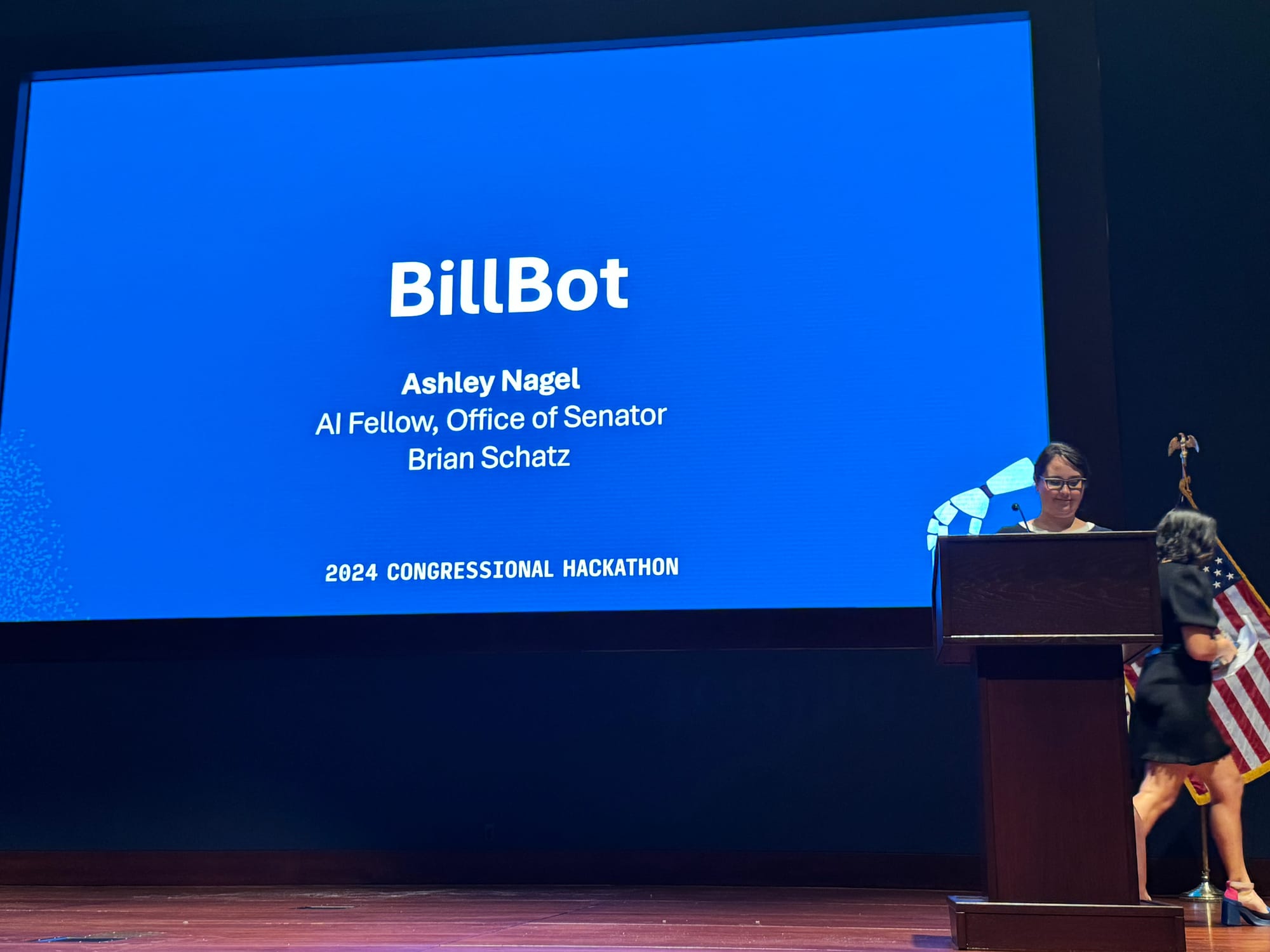
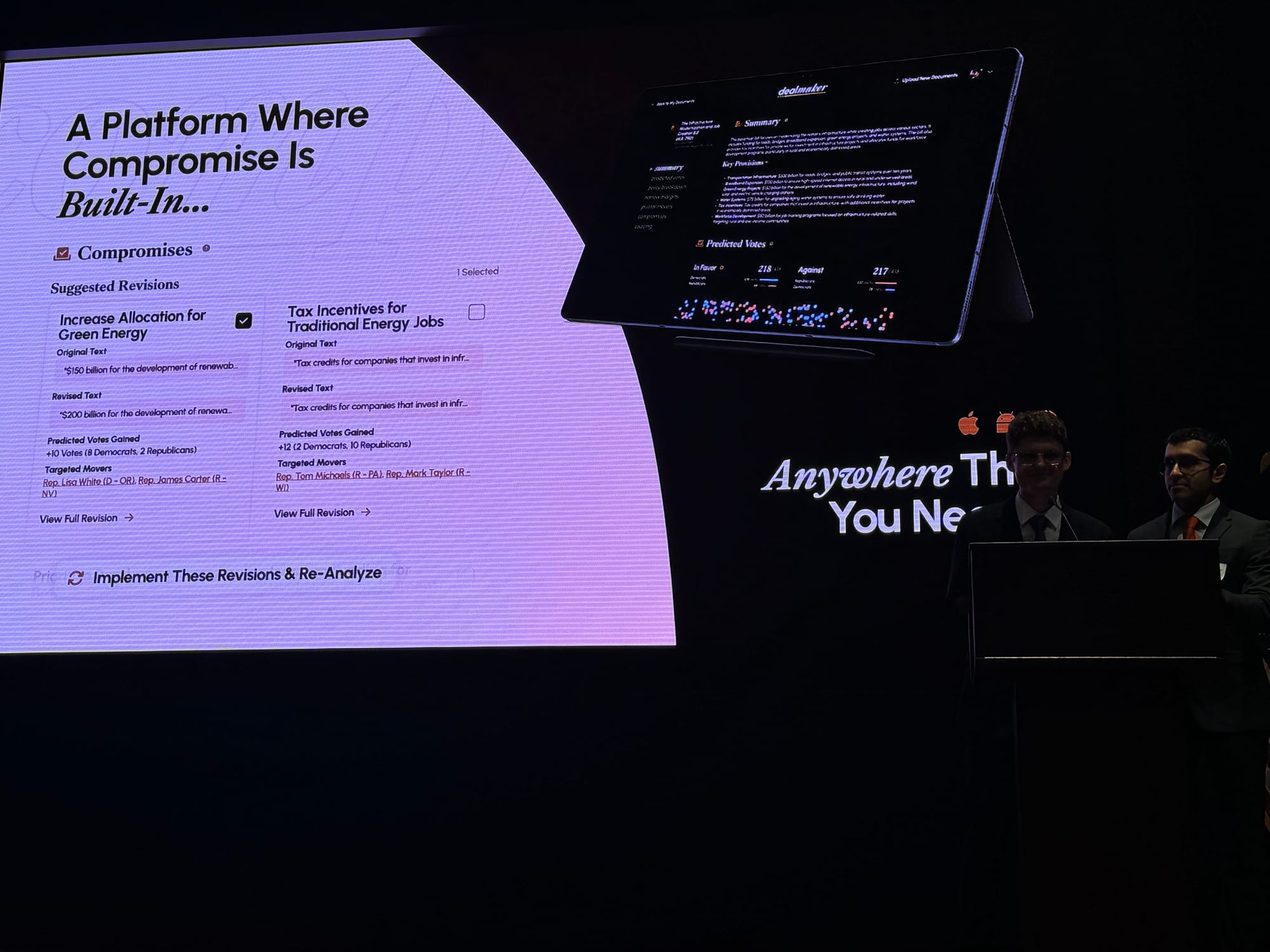
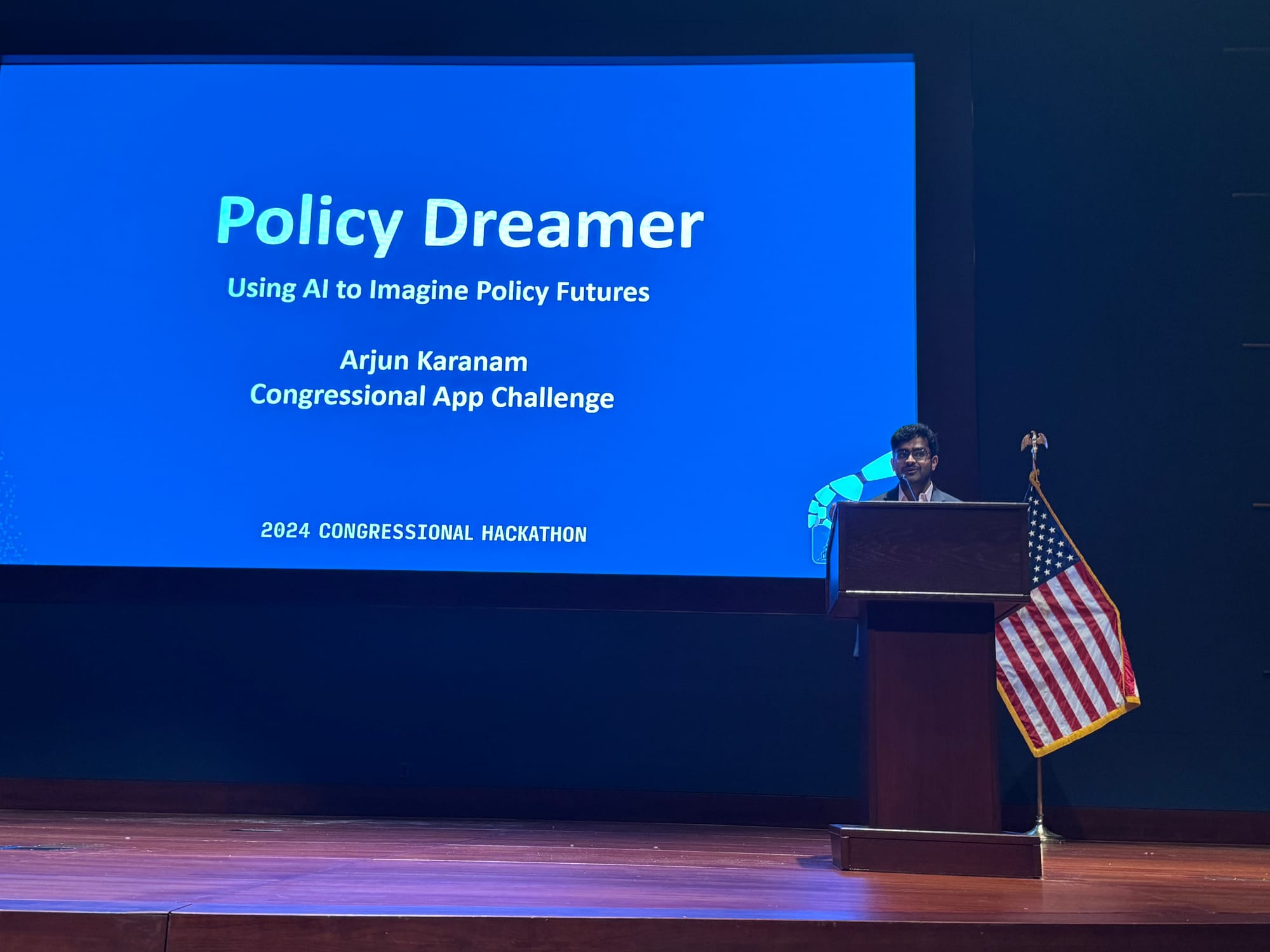
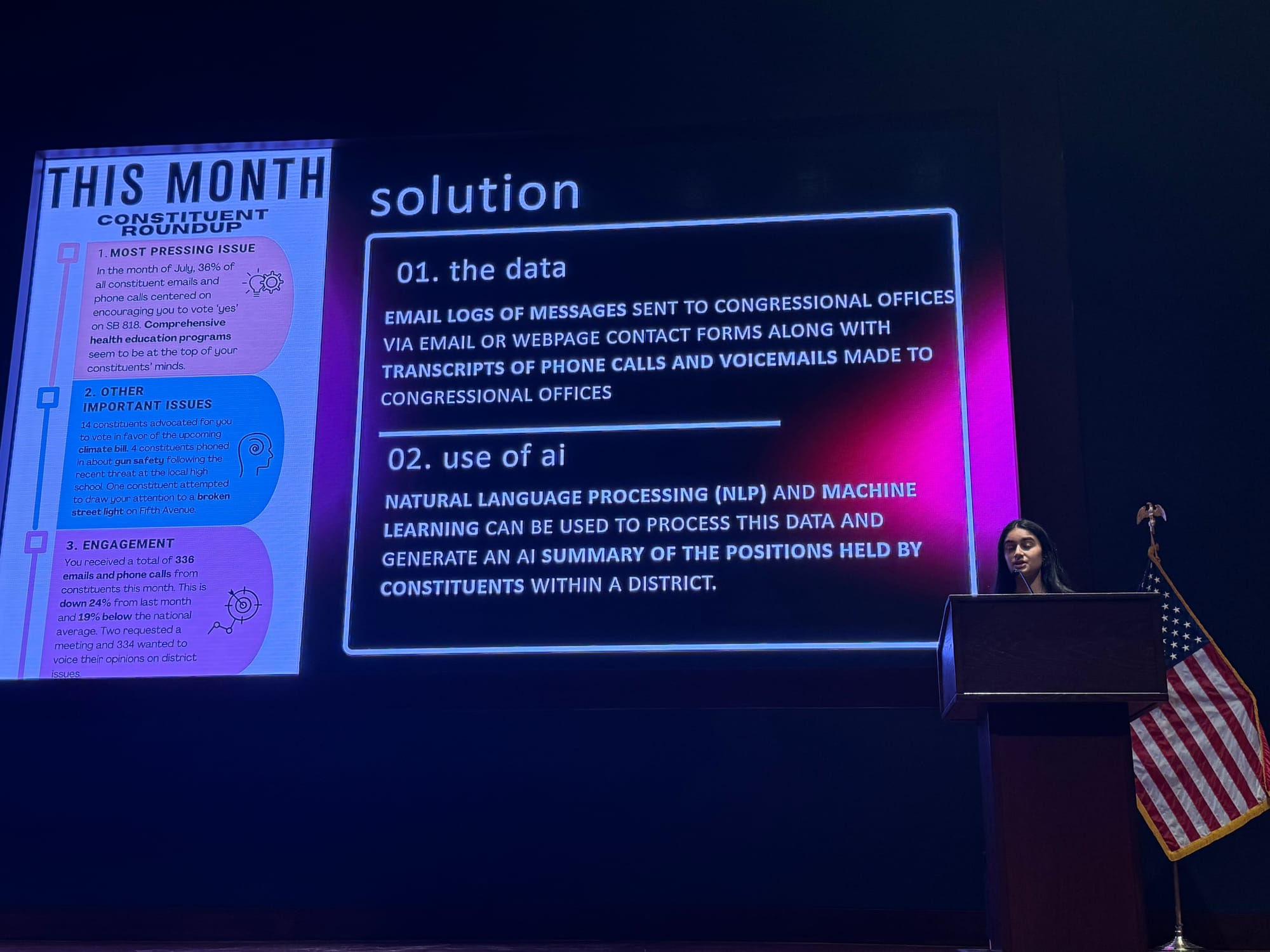
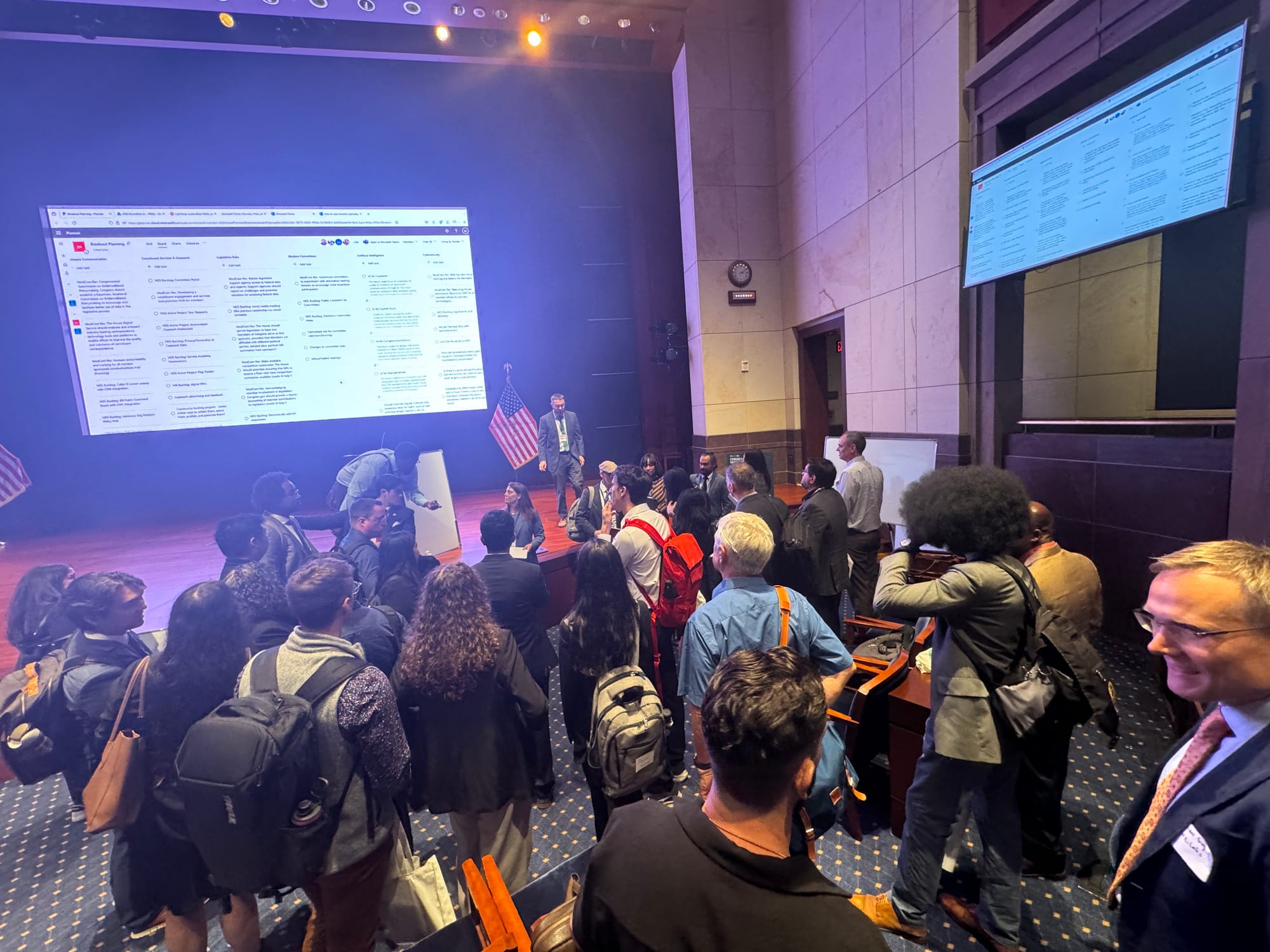
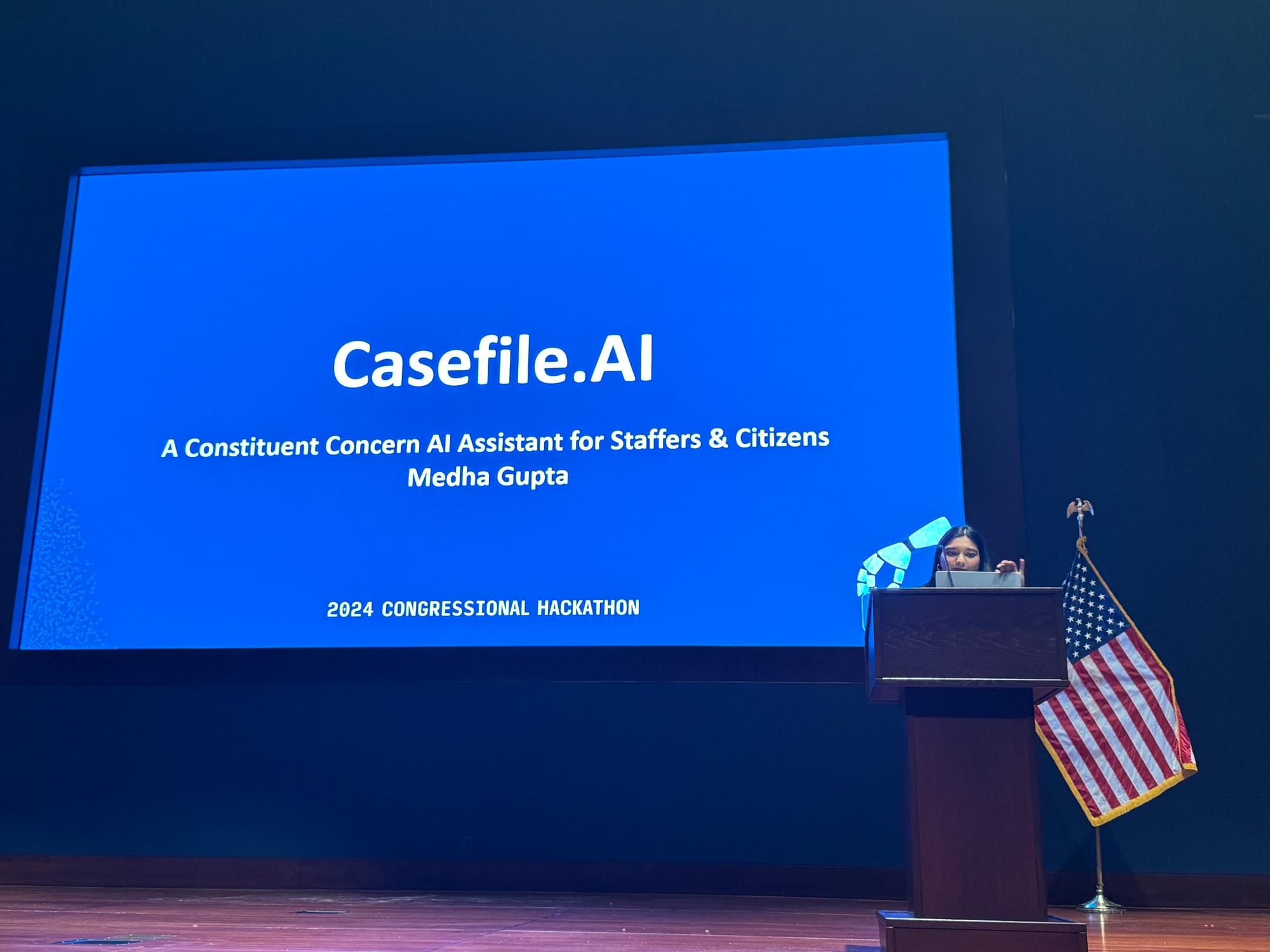
What excited me most, however, was not a new website or app that someone hoped would solve a societal problem, or an AI tool that would somehow save democracy if everyone used it. (I spent a decade chronicling such efforts, dear reader, and came to the conclusion that software engineers can’t solve human nature. I‘m bearish on the prospect of generative AI doing so.)
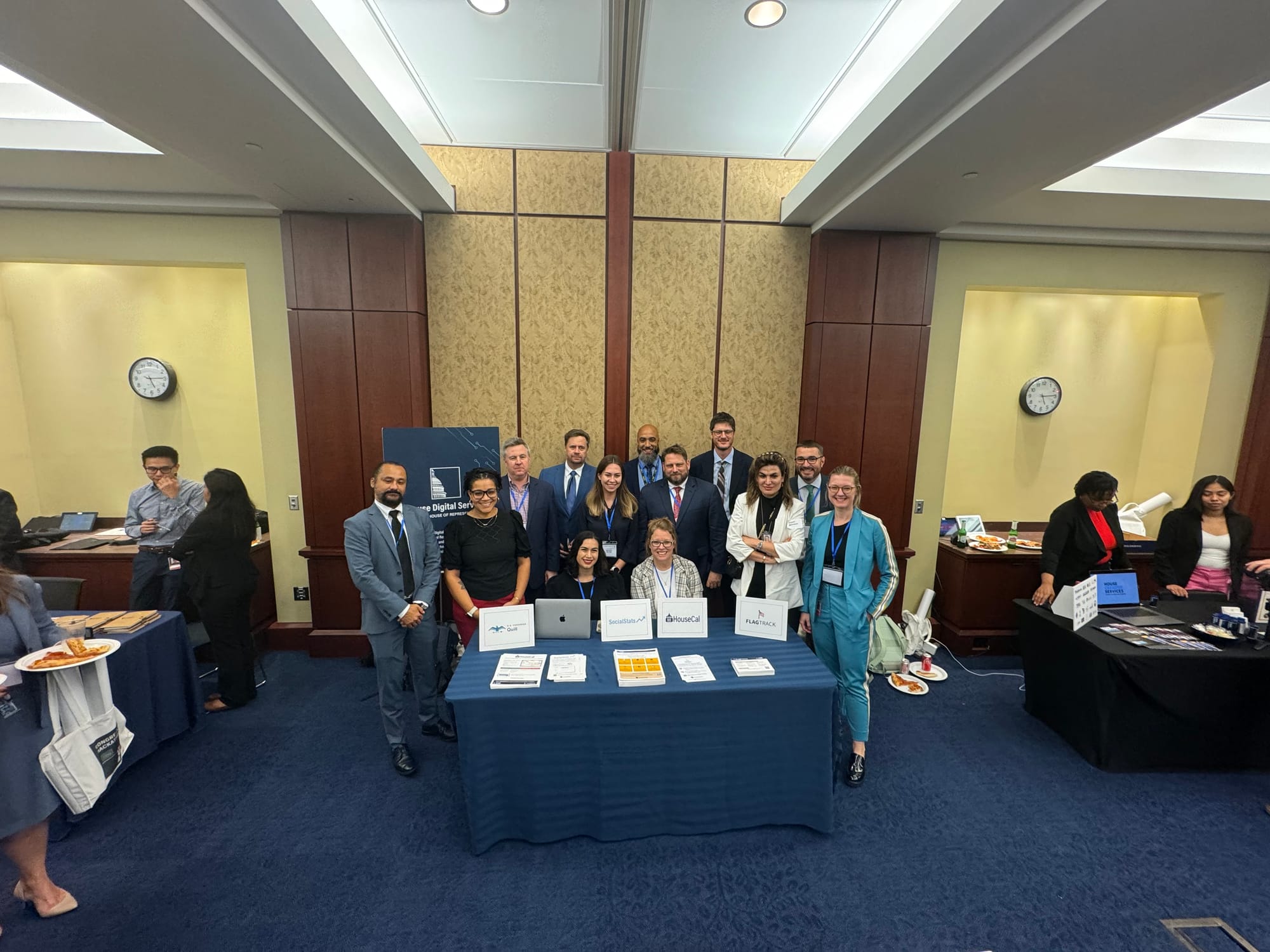
What did give me immense joy was seeing the House Digital Service at the reception afterwards sharing the services they’d built out to modernize Congress, like a a new constituent flag portal to help staff track the delivery of tens of thousand of flags to constituents or a calendaring tool to help deconflict hearings and meetings. As the good folks over at PopVox noted in August, these quiet efforts are generating modern, digital infrastructure that are improving Congress.
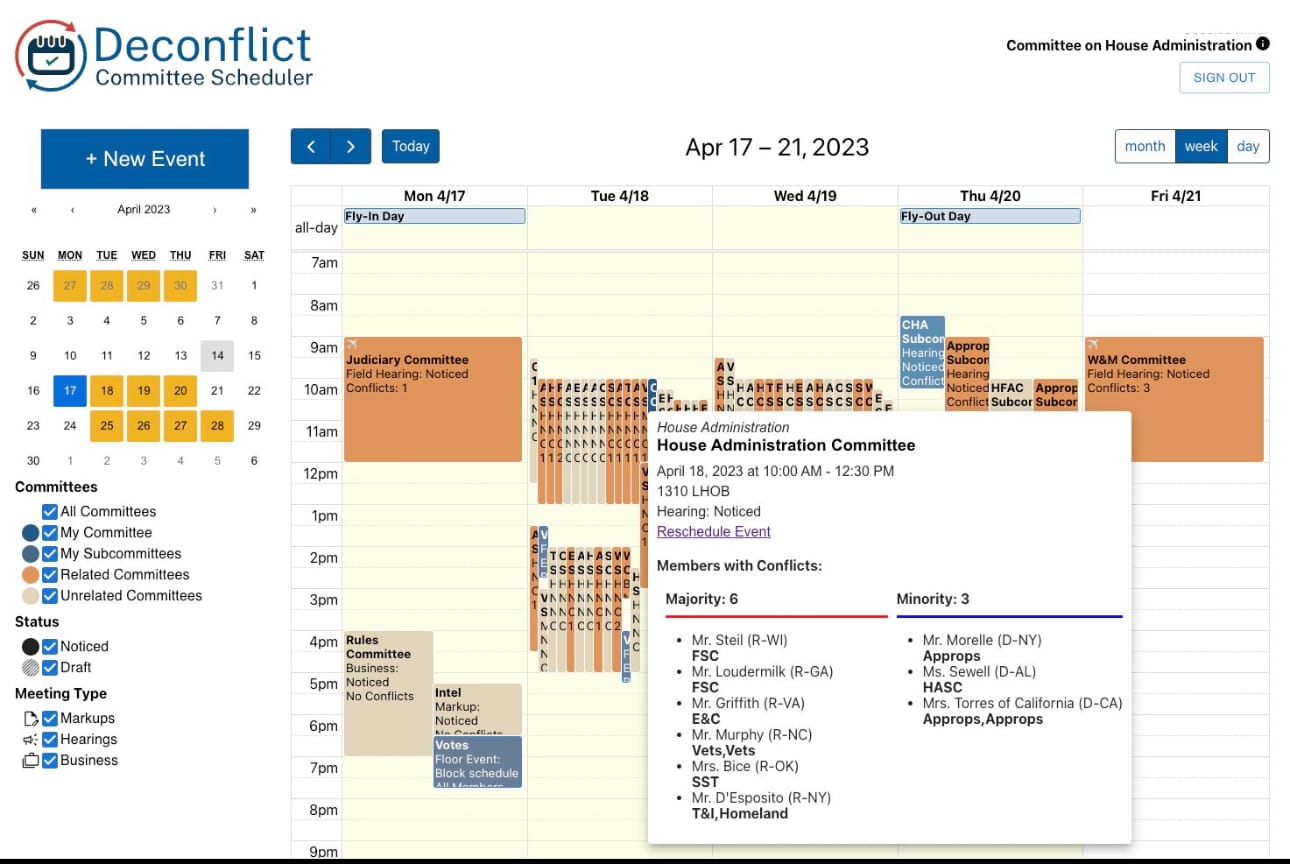
I expect more to come. You aren’t likely to read much about them in mainstream publications, hear about them on the news, or see civic softwre go viral online, but over time this kind of collaboration will lead to substantive improvements in citizen experience and legislative processes that — perhaps ironically — the civic hackathons of a decade past rarely generated.
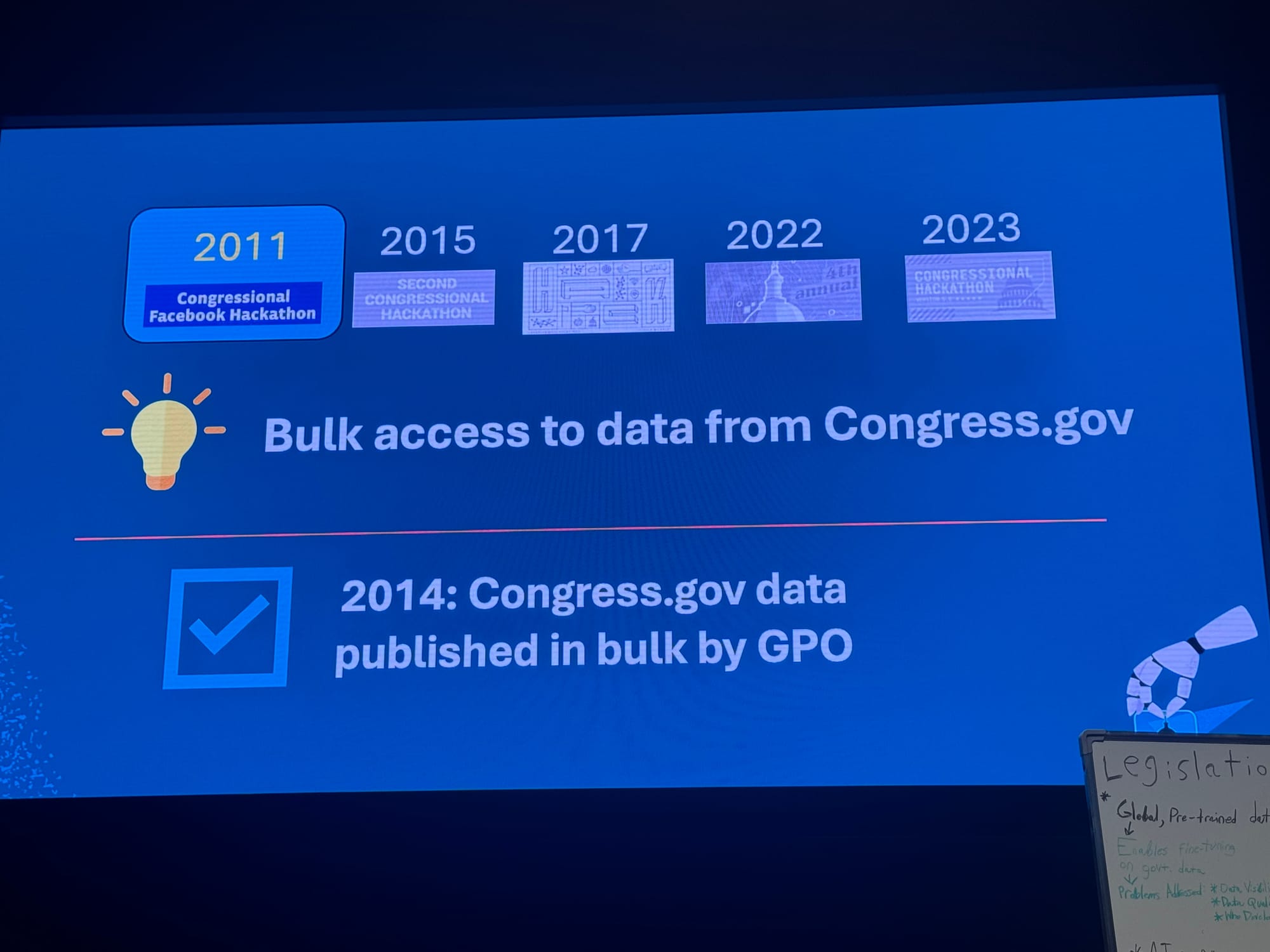
When I followed up with Steve Dwyer, who co-founded the hackathon in 2011 with then-staffer Matt Lira, he shared this list of improvements suggested by the hackathons that then were implanted by Congress.
2011 Hackathon’s top recommendation: Bulk access to data on Congress.gov. In 2012, the House created the Bulk Data Task Force. In 2014, more Congress.gov data is released in bulk by Government Publishing Office.
2011 Hackathon recommendation: Standard platform for committee video. in 2013, House committees all streamed online in uniform manner.
2011 Hackathon recommendation: “Real-Time Voting Information Updates.” In 2015, Congressional Hackathon co-founder Rep. Steny Hoyer’s office released the “Whip Watch app, later renamed Dome Watch.
2015 Hackathon’s top recommendation: a Public API for accessing Congress.gov data. in September 2022, the Library of Congress released a Congress.gov public API.
2015 Hackathon recommendation: Streamline online casework requests including e-signatures. In 2017, House CAO and a vendor both delivered fully-digital casework intake forms with e-signatures.
2017 Hackathon recommendation: An app to track tour requests. In 2018, a vendor delivered a specialized app for Congressional offices to track tours.
·2017 Hackathon recommendation: Build a central, nonpartisan resource database for Congressional staff. In 2021, House CAO created a Coaches program with a comprehensive compilation of staff resources by position.
2022 Hackathon recommendation: An online system for ordering flags flown over the U.S. Capitol. In September 2024, House CAO launched a FlagTrack app
2022 Hackathon recommendation: Digital Service for Congress. In 2022, House CAO created a House Digital Service.
2022 Hackathon recommendation: Modern advanced authentication. In 2022, House cybersecurity team expanded multi-factor authentication.
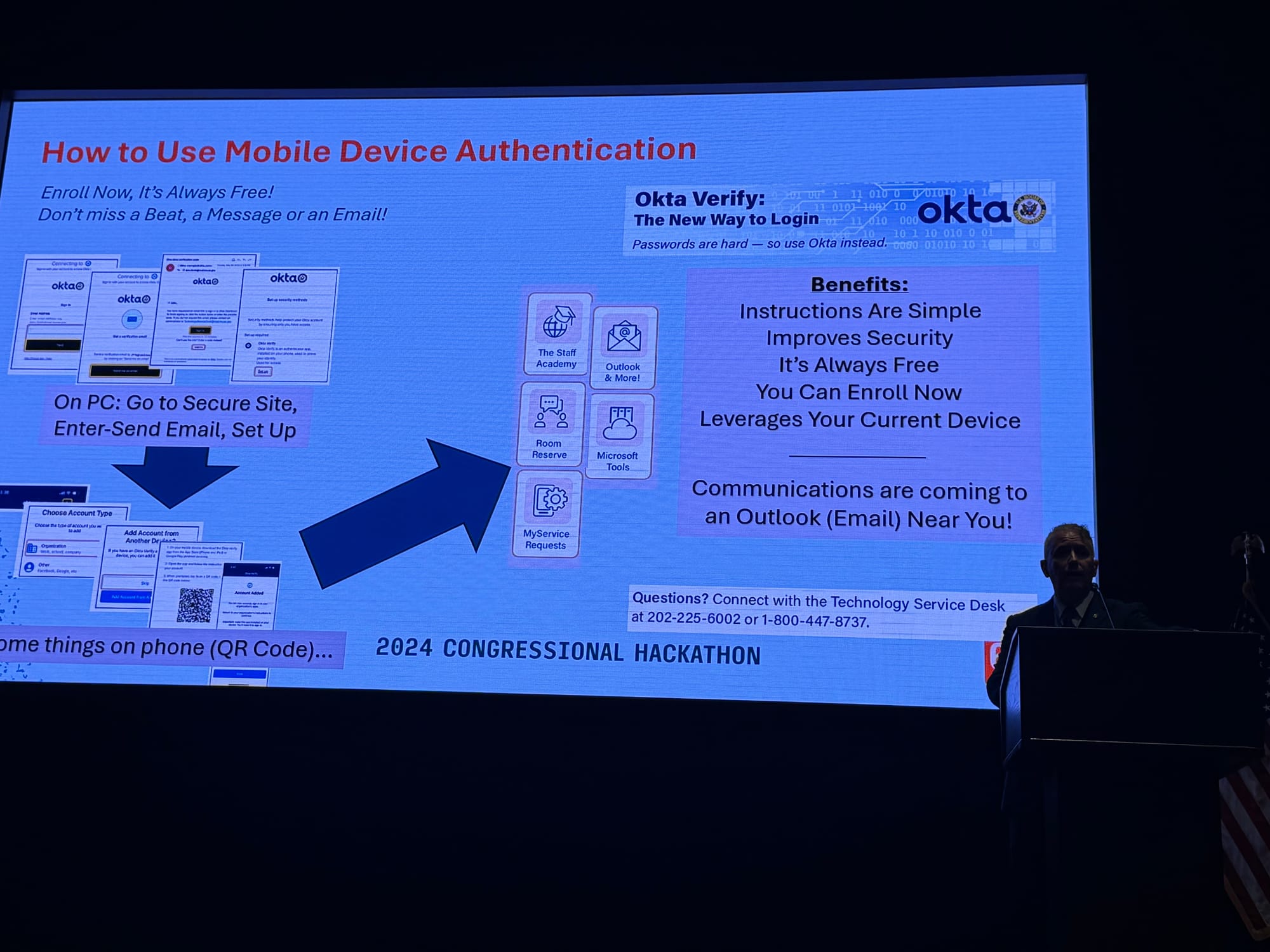
2023: Hackathon recommendation: Improve Social Media Tracking of Members. In September 2024: House CAO launched socialstats.house.gov.
2023 Hackathon recommendation: Develop a Centralized Online House Calendar. In July 2024, House CAO launched calendar.house.gov.
In 2024, we saw a ton of interesting ideas pitched from the breakout groups. I bet we’ll see some of them become real over the next year.
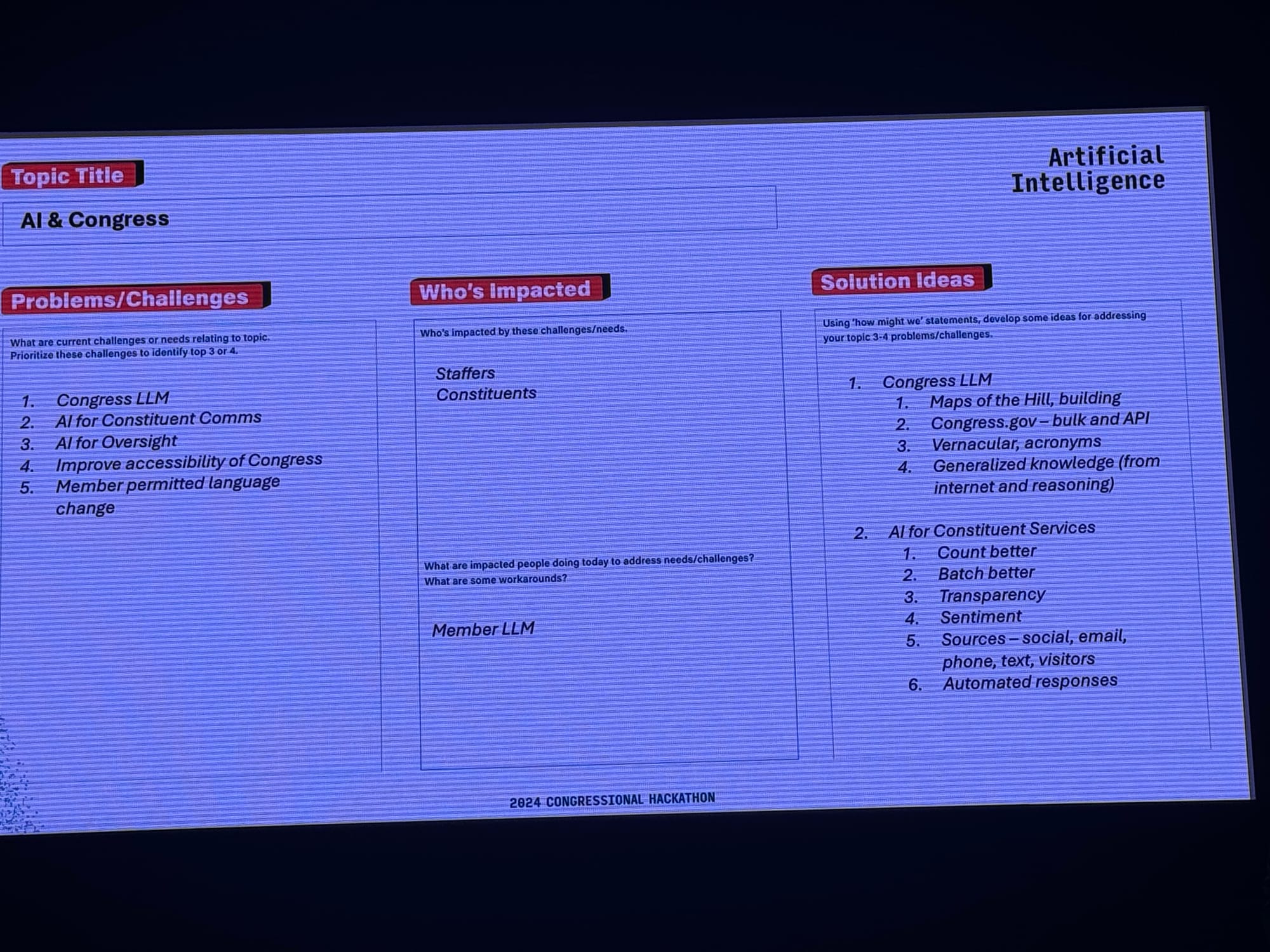
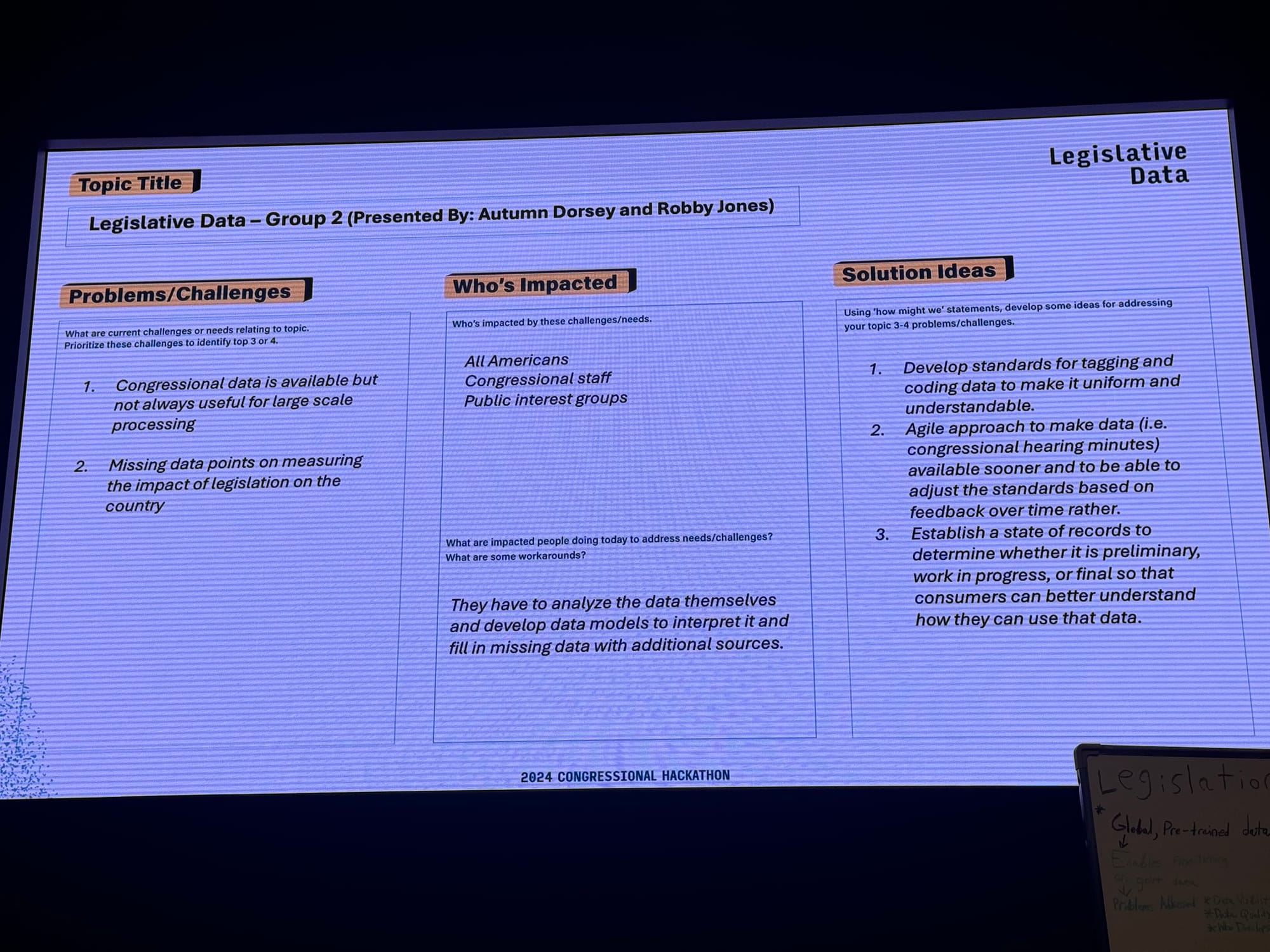
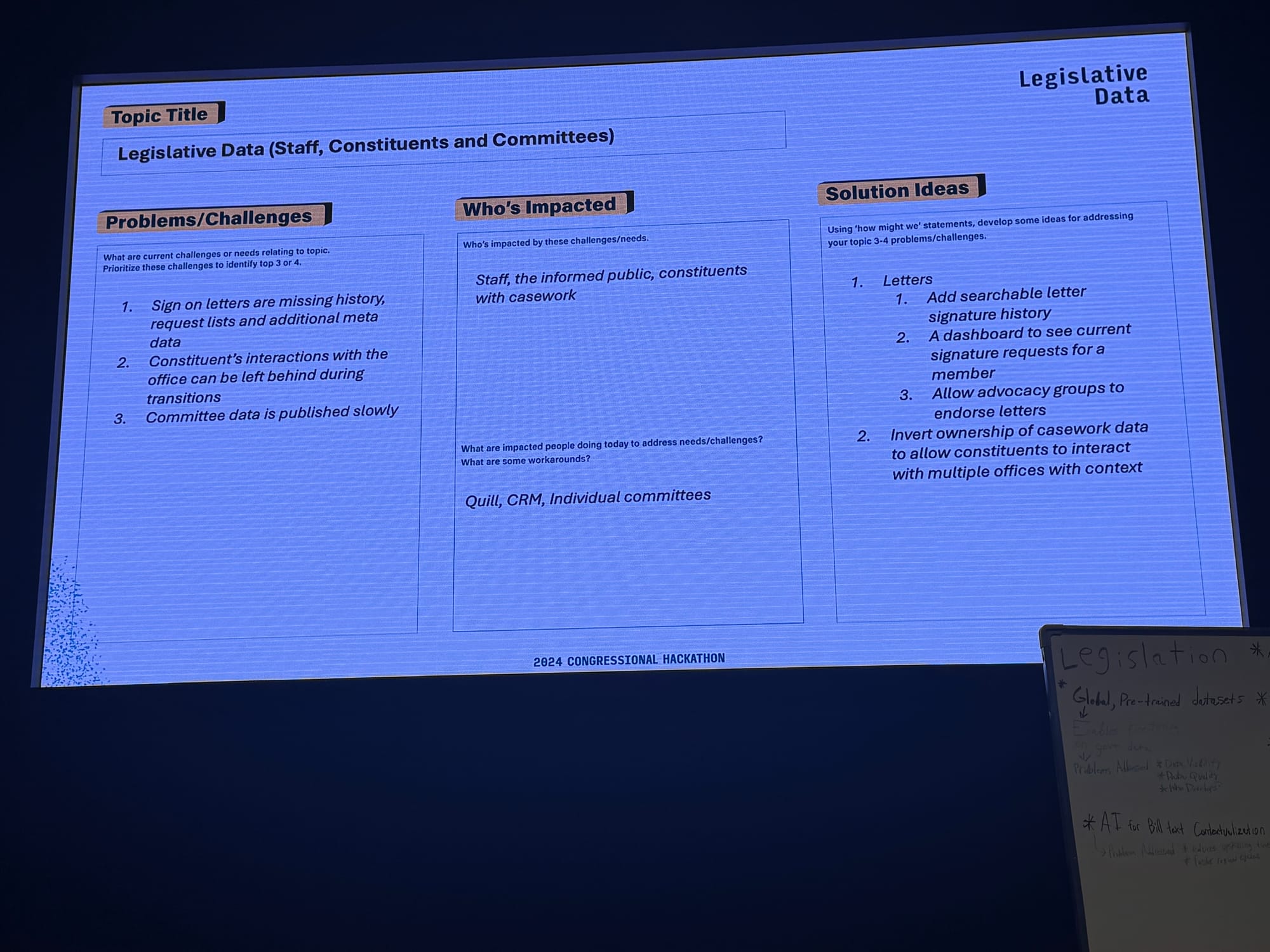
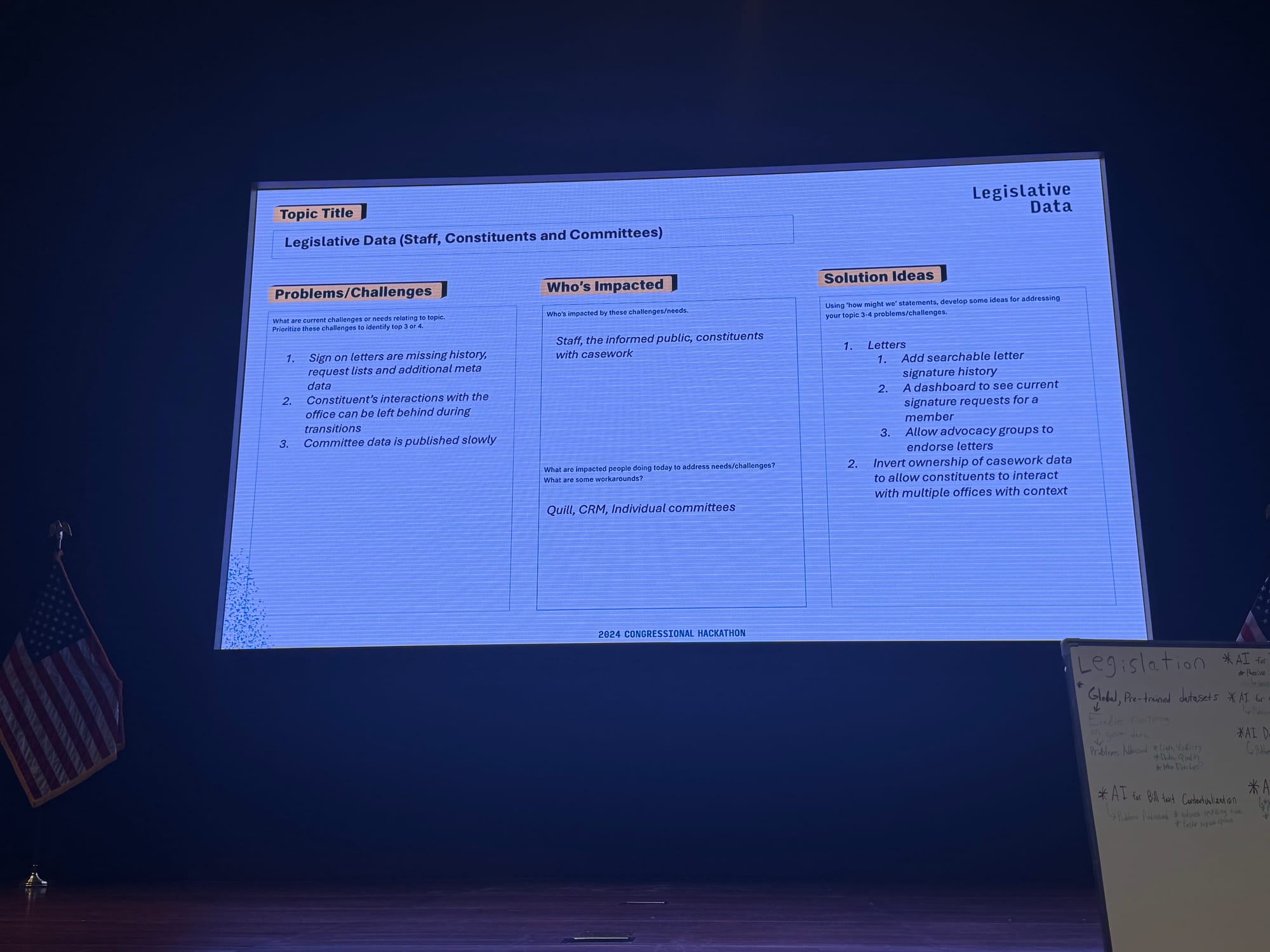
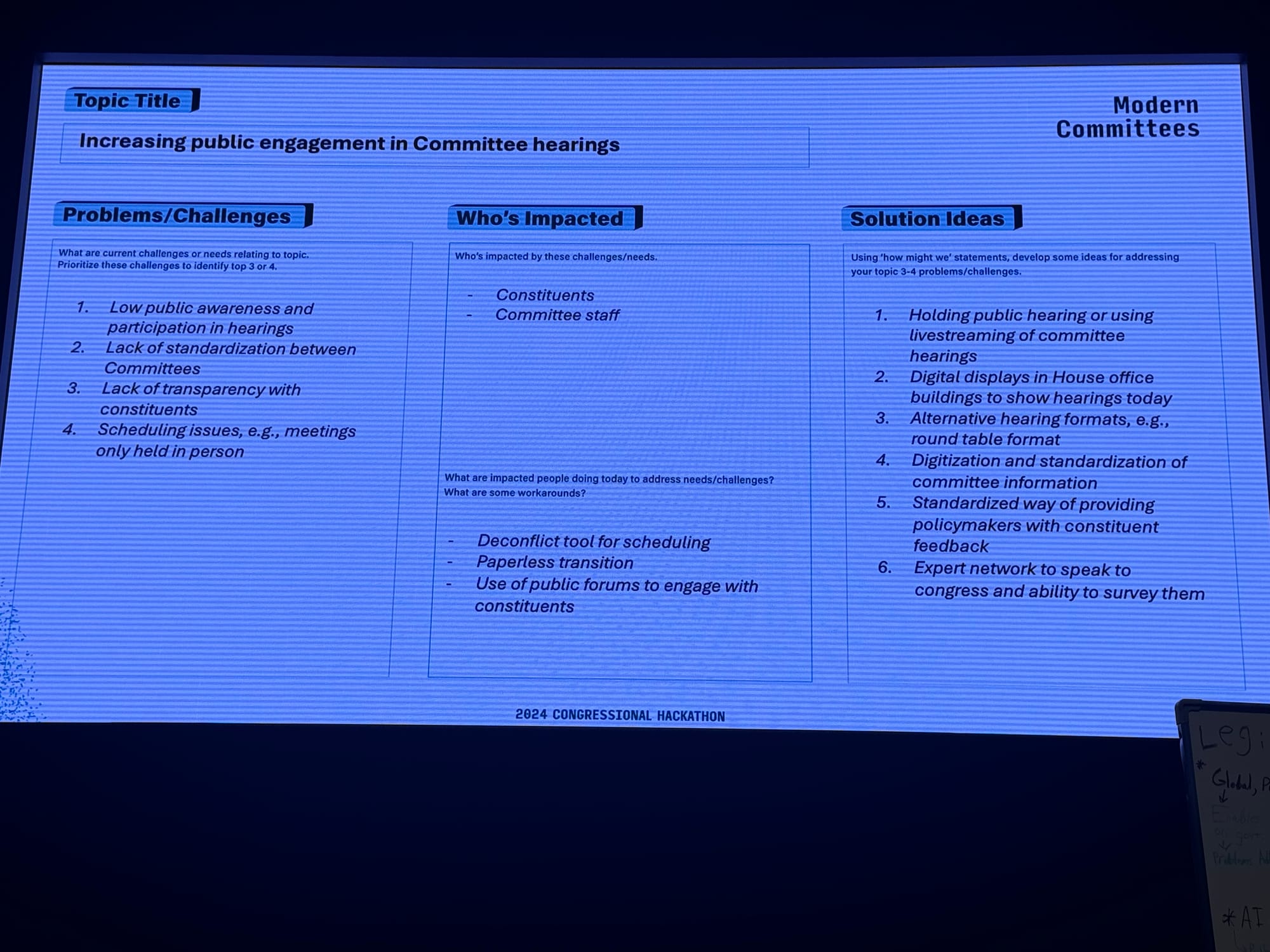
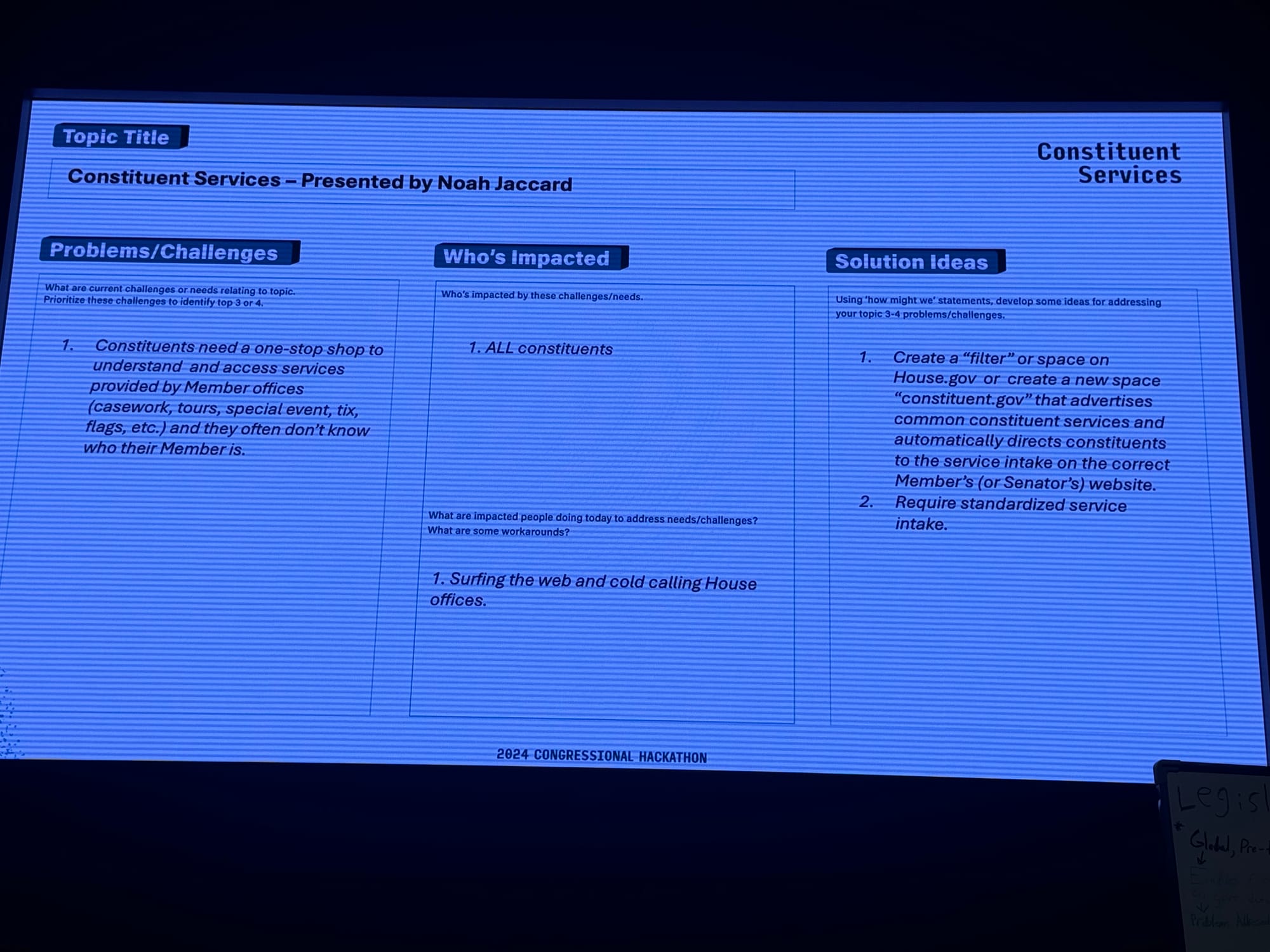
In a moment when doubt, denial, division, anger, and fear loom over our politics, that‘s a quintessentially American story worth sharing.
As always, thank you for subscribing and amplifying Civic Texts, which will not be sustainable without you.
Many thanks to everyone who has supported my work, particularly folks who have subscribed to memberships since our soft launch in April.
Please keep sharing these newsletters on social media and forwarding them on email. Organic growth by word of mouth and social recommendations is incredibly helpful.
You can always write to me with questions, comments, tips, features, or other feedback at alex@governing.digital or call/text at 410-849-9808. -Alex



